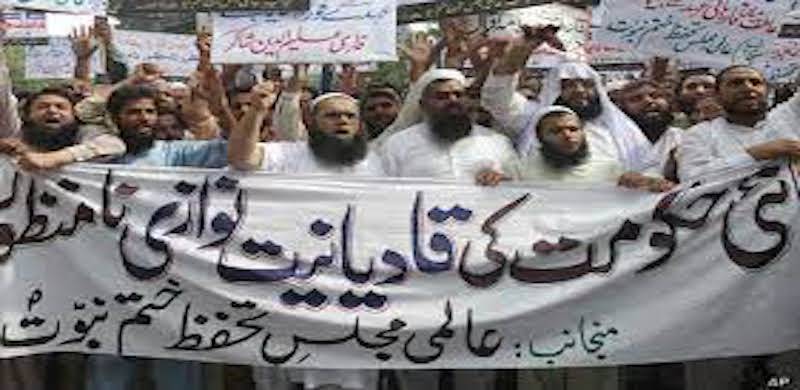
Sundas Malik, a Pakistani Kashmiri activist, who apparently practices law, was recently noted to have expressed:
“I want to say something to all my Muslim brothers, We Muslims made one mistake concerning Qadianis [Ahmadis], which we have to accept. Their leader Mirza Ahmad should have been killed right then and there. Prophet has said so…., He should have been cut into pieces at that very moment. But these Muslims sat down and did nothing, which made it worse, they should have killed him.”
One would have thought that an educated woman who is at the forefront of highlighting oppression in Indian occupied Kashmir, while living in a sea of Pakistani male chauvinism where conservative men draw ire against the 'liberals', would have known better. Sadly, her statement only highlights the limits of human rights activism that is not intersectional.
She reminds one of Pakistanis who raise heaven and hell on Kashmir but remain conveniently quiet on the persecution of Uyghurs in China. She also reminds one of the earlier feminists like Emily Murphy who fought for women rights but who also propagated racism against immigrants in Canada. Many women rights activists who uphold an intersectional framework based on the idea that all oppression is connected highlight the limits of such 'white' feminism that only caters to a particular group of privileged women ignoring the concerns of women of colour and women from other disadvantaged groups.
Sundas Malik’s murderous, genocidal, insensitive, cold, callous, ignorant and prejudiced expression raises the question that where all this hatred for the Ahmadis comes from, especially when their motto simply states, “Love for All, Hatred for none.” Such strong prejudice against Ahmadis is not found much among Arab or African Muslims, which indicates that this is less of a Muslim issue and more of a political one specific to Pakistan.
The use of the pronoun “we” is a common disease among self-righteous Muslims, who feel that they can speak on behalf of 1.6 billion Muslims. However, Islam is not a monolith. Shia Islam has many denominations including the Ithna Asharis, Zaydis, Ismailis and Bohras. Within the Bohras there are further divisions based on the Syedna one follows. Sunni Islam too has many factions including the Deobandis and Barelvis who are at loggerheads to the point of passing takfir (excommunication) against other another. Even among the Ahmadis there are two branches.
Taking these divisions even further, no two Muslims agree on everything. Take for instance an issue as trivial as the consumption of nutmeg where some believe it is permissible and others declare it to be prohibited. In a nutshell, if there are 1.6 billion Muslims, then there are 1.6 billion Islams, for there would be infinite permutations and combinations of Muslim issues on a plethora of issues, past, present and future.
Returning to Sundas Malik’s contempt for the Ahmadis, there is no defective gene that explains phobia against the Ahmadis, which indicates that this prejudice is a learned behaviour that has been inculcated through state institutions in Pakistan. What is sad is that many educated men and women are unable and unwilling to look beyond state propaganda and the foul religious narrative that has been weaved by clerics who are as power hungry as the state actors and politicians.
Maybe Sundas Malik will come out to express that her words were “taken out of context”, as is quite often the case when someone is caught with their foot in their mouth. On his part, the complicit and hypocritical Prime Minister, the hope of “Naya Pakistan” (new Pakistan) and who cowardly let go world renowned Ahmadi economist Atif Mian, would continue deflecting to western Islamophobia ignoring the festering persecution right below his nose. Similarly, Pakistanis will continue diminishing Ahmadi suffering with “ifs and buts.” Meanwhile, innocent Ahmadis will continue suffering under persecution.
Undoing this prejudice that has deeply seeped into Pakistani institutions and psyche is no easy task. Though, hope lies beyond Pakistan in places like Canada, where the National Council of Canadian Muslims stands by Ahmadis against Islamophobia despite the ignorant comments of a few Pakistani Canadians who immigrate their hatred along with themselves.
